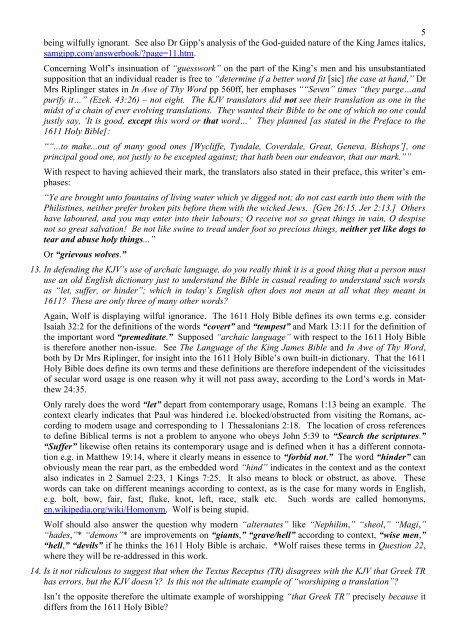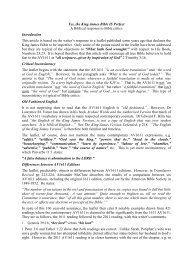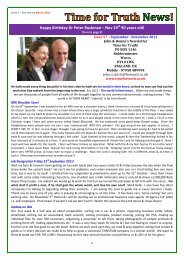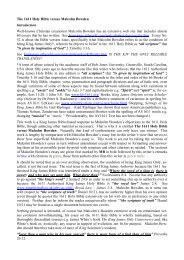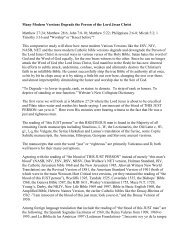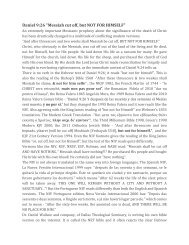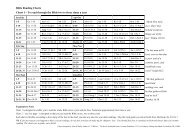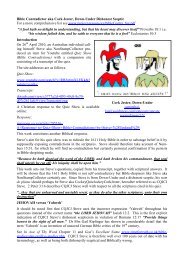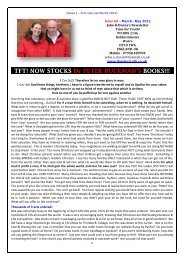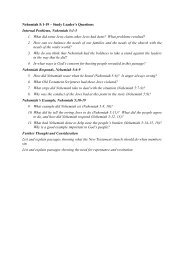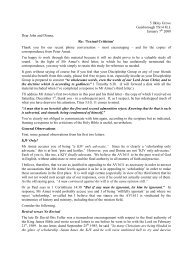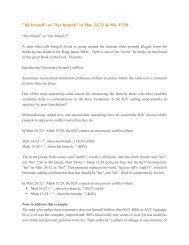A Grievous Wolf - Time for Truth
A Grievous Wolf - Time for Truth
A Grievous Wolf - Time for Truth
You also want an ePaper? Increase the reach of your titles
YUMPU automatically turns print PDFs into web optimized ePapers that Google loves.
5<br />
being wilfully ignorant. See also Dr Gipp’s analysis of the God-guided nature of the King James italics,<br />
samgipp.com/answerbook/?page=11.htm.<br />
Concerning <strong>Wolf</strong>’s insinuation of “guesswork” on the part of the King’s men and his unsubstantiated<br />
supposition that an individual reader is free to “determine if a better word fit [sic] the case at hand,” Dr<br />
Mrs Riplinger states in In Awe of Thy Word pp 560ff, her emphases ““Seven” times “they purge…and<br />
purify it…” (Ezek. 43:26) – not eight. The KJV translators did not see their translation as one in the<br />
midst of a chain of ever evolving translations. They wanted their Bible to be one of which no one could<br />
justly say, ‘It is good, except this word or that word…’ They planned [as stated in the Preface to the<br />
1611 Holy Bible]:<br />
““...to make...out of many good ones [Wycliffe, Tyndale, Coverdale, Great, Geneva, Bishops’], one<br />
principal good one, not justly to be excepted against; that hath been our endeavor, that our mark.””<br />
With respect to having achieved their mark, the translators also stated in their preface, this writer’s emphases:<br />
“Ye are brought unto fountains of living water which ye digged not; do not cast earth into them with the<br />
Philistines, neither prefer broken pits be<strong>for</strong>e them with the wicked Jews. [Gen 26:15. Jer 2:13.] Others<br />
have laboured, and you may enter into their labours; O receive not so great things in vain, O despise<br />
not so great salvation! Be not like swine to tread under foot so precious things, neither yet like dogs to<br />
tear and abuse holy things...”<br />
Or “grievous wolves.”<br />
13. In defending the KJV’s use of archaic language, do you really think it is a good thing that a person must<br />
use an old English dictionary just to understand the Bible in casual reading to understand such words<br />
as “let, suffer, or hinder”; which in today’s English often does not mean at all what they meant in<br />
1611? These are only three of many other words?<br />
Again, <strong>Wolf</strong> is displaying wilful ignorance. The 1611 Holy Bible defines its own terms e.g. consider<br />
Isaiah 32:2 <strong>for</strong> the definitions of the words “covert” and “tempest” and Mark 13:11 <strong>for</strong> the definition of<br />
the important word “premeditate.” Supposed “archaic language” with respect to the 1611 Holy Bible<br />
is there<strong>for</strong>e another non-issue. See The Language of the King James Bible and In Awe of Thy Word,<br />
both by Dr Mrs Riplinger, <strong>for</strong> insight into the 1611 Holy Bible’s own built-in dictionary. That the 1611<br />
Holy Bible does define its own terms and these definitions are there<strong>for</strong>e independent of the vicissitudes<br />
of secular word usage is one reason why it will not pass away, according to the Lord’s words in Matthew<br />
24:35.<br />
Only rarely does the word “let” depart from contemporary usage, Romans 1:13 being an example. The<br />
context clearly indicates that Paul was hindered i.e. blocked/obstructed from visiting the Romans, according<br />
to modern usage and corresponding to 1 Thessalonians 2:18. The location of cross references<br />
to define Biblical terms is not a problem to anyone who obeys John 5:39 to “Search the scriptures.”<br />
“Suffer” likewise often retains its contemporary usage and is defined when it has a different connotation<br />
e.g. in Matthew 19:14, where it clearly means in essence to “<strong>for</strong>bid not.” The word “hinder” can<br />
obviously mean the rear part, as the embedded word “hind” indicates in the context and as the context<br />
also indicates in 2 Samuel 2:23, 1 Kings 7:25. It also means to block or obstruct, as above. These<br />
words can take on different meanings according to context, as is the case <strong>for</strong> many words in English,<br />
e.g. bolt, bow, fair, fast, fluke, knot, left, race, stalk etc. Such words are called homonyms,<br />
en.wikipedia.org/wiki/Homonym. <strong>Wolf</strong> is being stupid.<br />
<strong>Wolf</strong> should also answer the question why modern “alternates” like “Nephilim,” “sheol,” “Magi,”<br />
“hades,”* “demons”* are improvements on “giants,” “grave/hell” according to context, “wise men,”<br />
“hell,” “devils” if he thinks the 1611 Holy Bible is archaic. *<strong>Wolf</strong> raises these terms in Question 22,<br />
where they will be re-addressed in this work.<br />
14. Is it not ridiculous to suggest that when the Textus Receptus (TR) disagrees with the KJV that Greek TR<br />
has errors, but the KJV doesn’t? Is this not the ultimate example of “worshiping a translation”?<br />
Isn’t the opposite there<strong>for</strong>e the ultimate example of worshipping “that Greek TR” precisely because it<br />
differs from the 1611 Holy Bible?


